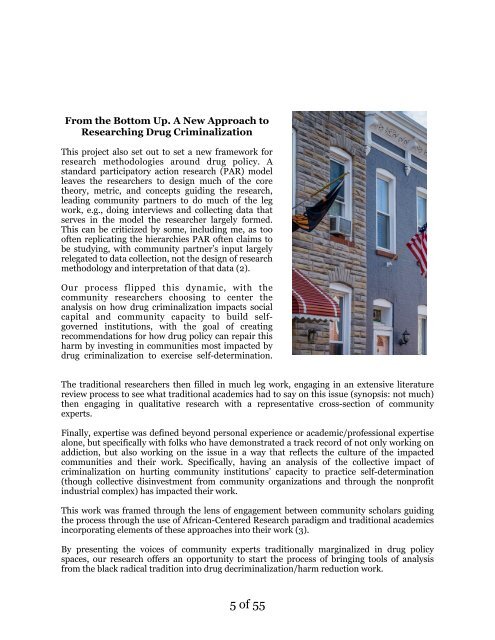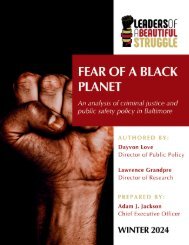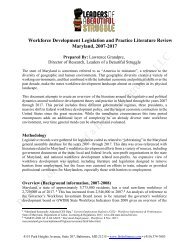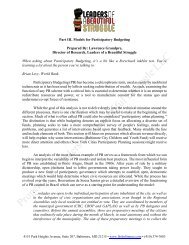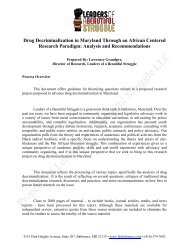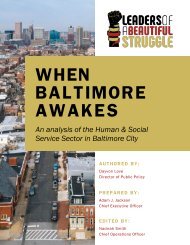The Communal Impacts of Drug Criminalization in Maryland
This project attempts to reframe the harms of drug criminalization. Influenced by African-Centered Research Methodologies, we engaged in a literature review and qualitative research of the communal impacts of drug decriminalization in Maryland, with a specific focus on Baltimore.
This project attempts to reframe the harms of drug criminalization. Influenced by African-Centered Research Methodologies, we engaged in a literature review and qualitative research of the communal impacts of drug decriminalization in Maryland, with a specific focus on Baltimore.
Create successful ePaper yourself
Turn your PDF publications into a flip-book with our unique Google optimized e-Paper software.
From the Bottom Up. A New Approach to<br />
Research<strong>in</strong>g <strong>Drug</strong> <strong>Crim<strong>in</strong>alization</strong><br />
This project also set out to set a new framework for<br />
research methodologies around drug policy. A<br />
standard participatory action research (PAR) model<br />
leaves the researchers to design much <strong>of</strong> the core<br />
theory, metric, and concepts guid<strong>in</strong>g the research,<br />
lead<strong>in</strong>g community partners to do much <strong>of</strong> the leg<br />
work, e.g., do<strong>in</strong>g <strong>in</strong>terviews and collect<strong>in</strong>g data that<br />
serves <strong>in</strong> the model the researcher largely formed.<br />
This can be criticized by some, <strong>in</strong>clud<strong>in</strong>g me, as too<br />
<strong>of</strong>ten replicat<strong>in</strong>g the hierarchies PAR <strong>of</strong>ten claims to<br />
be study<strong>in</strong>g, with community partner’s <strong>in</strong>put largely<br />
relegated to data collection, not the design <strong>of</strong> research<br />
methodology and <strong>in</strong>terpretation <strong>of</strong> that data (2).<br />
Our process flipped this dynamic, with the<br />
community researchers choos<strong>in</strong>g to center the<br />
analysis on how drug crim<strong>in</strong>alization impacts social<br />
capital and community capacity to build selfgoverned<br />
<strong>in</strong>stitutions, with the goal <strong>of</strong> creat<strong>in</strong>g<br />
recommendations for how drug policy can repair this<br />
harm by <strong>in</strong>vest<strong>in</strong>g <strong>in</strong> communities most impacted by<br />
drug crim<strong>in</strong>alization to exercise self-determ<strong>in</strong>ation.<br />
<strong>The</strong> traditional researchers then filled <strong>in</strong> much leg work, engag<strong>in</strong>g <strong>in</strong> an extensive literature<br />
review process to see what traditional academics had to say on this issue (synopsis: not much)<br />
then engag<strong>in</strong>g <strong>in</strong> qualitative research with a representative cross-section <strong>of</strong> community<br />
experts.<br />
F<strong>in</strong>ally, expertise was def<strong>in</strong>ed beyond personal experience or academic/pr<strong>of</strong>essional expertise<br />
alone, but specifically with folks who have demonstrated a track record <strong>of</strong> not only work<strong>in</strong>g on<br />
addiction, but also work<strong>in</strong>g on the issue <strong>in</strong> a way that reflects the culture <strong>of</strong> the impacted<br />
communities and their work. Specifically, hav<strong>in</strong>g an analysis <strong>of</strong> the collective impact <strong>of</strong><br />
crim<strong>in</strong>alization on hurt<strong>in</strong>g community <strong>in</strong>stitutions’ capacity to practice self-determ<strong>in</strong>ation<br />
(though collective dis<strong>in</strong>vestment from community organizations and through the nonpr<strong>of</strong>it<br />
<strong>in</strong>dustrial complex) has impacted their work.<br />
This work was framed through the lens <strong>of</strong> engagement between community scholars guid<strong>in</strong>g<br />
the process through the use <strong>of</strong> African-Centered Research paradigm and traditional academics<br />
<strong>in</strong>corporat<strong>in</strong>g elements <strong>of</strong> these approaches <strong>in</strong>to their work (3).<br />
By present<strong>in</strong>g the voices <strong>of</strong> community experts traditionally marg<strong>in</strong>alized <strong>in</strong> drug policy<br />
spaces, our research <strong>of</strong>fers an opportunity to start the process <strong>of</strong> br<strong>in</strong>g<strong>in</strong>g tools <strong>of</strong> analysis<br />
from the black radical tradition <strong>in</strong>to drug decrim<strong>in</strong>alization/harm reduction work.<br />
5 <strong>of</strong> 55


